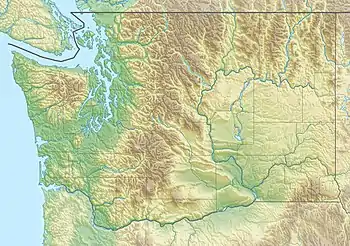| Chetwoot Lake | |
|---|---|
 Chetwoot Lake  Chetwoot Lake | |
| Location | King County, Washington, United States |
| Coordinates | 47°33′24″N 121°18′52″W / 47.5565906°N 121.3144193°W |
| Primary outflows | West Fork Foss River |
| Basin countries | United States |
| Surface area | 113 acres (0.46 km2)[1] |
| Surface elevation | 4,908 ft (1,496 m) |
Chetwoot Lake is a freshwater lake located on the western slope of Iron Cap Mountain next to Crawford Lake, in King County, Washington. West Fork Foss River exits Chetwoot Lake towards Angeline Lake and then to a canyon that produces Angeline Falls downstream towards Delta Lake. Because Chetwoot Lake is at the heart of the Alpine Lakes Wilderness, the lake is a popular area for hiking, swimming, and fishing.[2]
Chetwoot is a compound word from the Chinook Jargon chet’-woot or its’woot meaning black bear or grizzly.[3]
Geography
Chetwoot Lake is nestled in a long structural benchland with relatively level or gently inclined land bounded by the distinctly steeper slopes of Tourmaline Peak on the northwest shore of the lake and Atrium Peak above and between Angeline and Big Heart Lake.[4][5] The lake covers 0.5 kilometres (0.31 mi) from north to south and 1.1 kilometres (0.68 mi) from east to west. The valley follows patterns of geomorphology typical of the Northern Cascade Mountains of the Pacific Mountain System with a bedrock composed of pyrrhotite and pyrite found in thin seams 804 metres (2,638 ft) wide at a depth of 304 metres (997 ft) below the surface.[6] The host rock in this area is greensand from the Lopingian epoch 260 to 250 million years ago.
Climate
Chetwoot Lake is within a hemiboreal climate.[7] The average temperature is 0 °C. The warmest month is August, with an average temperature of 13 °C, and the coldest month is January, at an average of −10 °C.[8] The average rainfall is 2,989 millimeters per year. The wettest month is January, with 396 millimeters of rain, and the least in July, with 38 millimeters of rain.[9]
| ||||||||||||||||||||||||||||||||||||||||||||||||||||||||||||||||||||||||||||||||||||||||||||||||||||||||||||||||||||||||||||
Access
Access to Chetwoot Lake is through West Fork Foss Lakes Trail #1064 off Forest Service road 6835 a side road of Foss River Road (Forest Service Road #68), which exits US Highway 2. The trail borders Trout Lake, Lake Malachite, Copper lake and Little Heart Lake before ending on campsites along Atrium Peak, the ridge between Big Heart Lake and Angeline Lake to the East.[10] Self-issued Alpine Lake Wilderness permit required for transit within the Necklace Valley area.[11]
See also
References
- ↑
- ↑ Samson, karl (1999). Frommer's Great Outdoor Guide to Washington & Oregon. Wiley. p. 182. ISBN 9780028633091.
- ↑ Gibbs, George (1863). "DICTIONARY OF THE CHINOOK JARGON, OR, TRADE LANGUAGE OF OREGON" (PDF). Cramoisy Press. Retrieved 23 March 2021.
- ↑ Volken, Martin (2014). Backcountry Ski & Snowboard Routes Washington. Mountaineers Books. ISBN 9781594856570.
- ↑ Scarmuzzi, Don J. (2014). Day Hikes in Washington State: 90 Favorite Trails, Loops, and Summit Scrambles. Mountaineers Books. pp. 224–226. ISBN 9781513267289.
- ↑ "Iron Cap Prospect". Diggings. Retrieved 23 March 2021.
- ↑ Peel, M C; Finlayson, B L. "Updated world map of the Köppen-Geiger climate classification". Hydrology and Earth System Sciences. 11: 1639–1640. doi:10.5194/hess-11-1633-2007. Retrieved 19 March 2021.
- ↑ "NASA Earth Observations Data Set Index". NASA. Archived from the original on 11 May 2020. Retrieved 19 March 2021.
- 1 2 "Chetwoot Lake, Washington Climate Averages". WeatherWX. Retrieved 15 April 2021.
- ↑ "Atrium Peak, Washington". PeakBagger.com. Retrieved 23 March 2021.
- ↑ "West Fork Foss Lakes Trail 1064". United States Department of Agriculture. Retrieved 23 March 2021.